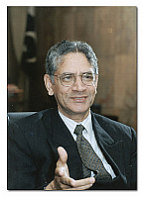Op-ed: We need wider debate on Kashmir
Published in Daily Times on September 8, 2003
I have heard some people in Pakistan say that Kashmir indeed can be liberated. But at what cost and risk?
A muted debate on Kashmir is underway in Pakistan. But it needs to be widened to address the larger issues involved. A spotlight on Kashmir alone obscures the broader context hosting the issue and limits our understanding of Kashmir; besides, it subverts our search for a solution.
Kashmir is not just a foreign policy issue; it is a national issue. But does it represent our aggregate national interests? Unfortunately, there has been no tradition in Pakistan of developing a consensus on the formulation of national interests. It is true that, either by default or design, countries do not always follow policies consistent with national consensus. But the leadership should at least have some vision of what is best for the country and seek public support for it by being a good educator. Democracy or no democracy, there should be some method of running our collective concerns through public discussion of possible policy options. This has rarely, if ever, happened in Pakistan.
Take security interests, for instance. We must evaluate whether our Kashmir policy enhances or weakens our economic strength and political stability that are vital constituents of national security. Escalating national concern on Kashmir has only strengthened the fundamentalist forces in Pakistan and raised their profile. Imagine the heavy price we have paid for it, especially during the nineties when our internal stability was strained and undermined not only by religious extremism but also ethnic conflict and poor governance. And we continue to suffer to a varying degree, despite some containment of extremism and militancy.
In such a fragile national environment, it has not been easy to pursue a forward foreign policy that tried to transcend the disparity between our objectives and capability. A weakened society has been vastly over-stretching strategically, and at the expense of political process too. Pakistan has thus become a focus of global concern.
Kashmir has imposed a heavy moral and strategic burden on Pakistanís foreign policy commitments. Speaking of which, our concern about Kashmir and India does not exhaust these interests. Pakistan has other neighbours, ranging from Afghanistan and Iran to China and Russia. Barring China, with whom we have enjoyed excellent relations, we have varying degree of difficulties with the other three, stemming from our close proximity to the resource-rich areas, such as Central Asia and the Gulf. In both the regions Iranís political ambitions and Russian strategic shadow loom large, intersecting Pakistanís interests. Both countries therefore seek a convergence with an India hostile to Pakistan. Difficulties with India thus compound our difficulties with other neighbours, which means our foreign policy interests go well beyond Kashmir. In fact, Kashmir does not even fill up our overall interests with India.
I have heard some people in Pakistan say that Kashmir indeed can be liberated. But at what cost and risk? They do not address this question. They somehow do not realise that self-consciousness of power must be tempered by awareness and appreciation of limitations of power. This is true as much of India as of Pakistan. But the important thing is that India does seem to have a policy on Kashmir, though perhaps no position. This enables it to keep modulating its rhetoric, speaking different things at different times, and switching off and resuming the dialogue when it suits her. It thus manipulates and influences the international public opinion and diplomatic support in the process. Pakistan, on the other hand, has no policy but an indelible position. So we cannot play our diplomatic cards as deftly as India. We may have principles but no strategy. India has a strategy but apparently no principles.
Kashmir is a politico-military dispute where diplomacy and the ground situation should have been mutually supportive but in actual fact they have been mutually exclusive. We may have thus missed opportunities of translating ground realities into a diplomatic gain because the instrument of doing so (negotiations with India) was either not available or was not made full use of, regrettably due to the intransigence of both sides. And sometimes we were simply not ready because of lack of consensus in our internal power structure and unprepared public opinion. So both sides chose to continue to live dangerously. This turned out to be in Indiaís favour as the passage of time has had an impact on the ground situation. India may now be willing to talk to us not because the Americans have told her so; it may suit her also.
We have to go to the talks with India, as and when they take place, with a fresh approach. More of the same, by both sides, will once again stymie the dialogue and suit India. Basically we have to ask ourselves what is it that we want in Kashmir? And what do the Kashmiris want? Without sacrificing principles and our moral commitment, should not the Kashmir dispute be framed by our overall relations with India rather than for it to become the rock on which relations would always make shipwreck? Within this broader conceptual framework the Foreign Office can develop a negotiating strategy to search for the solution of the dispute. The solution is not all up to us; India bears the major onus, but we will have to play our part.
Public debates do not always result in clear formulation of national policies as the arguments come to be dominated by organised special interests and more influential and powerful social groups. Yet they are great solvents of fixed habits of thoughts and long-held views and may point up alternative approaches. This gives greater manoeuvrability to the leadership in their choice of policies that are in the best national interest. I am confident the present pragmatic leadership recognises the necessity for change.
The writer is a former Ambassador
|



